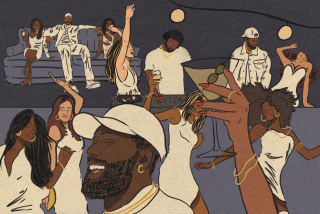Misconceptions about world of rap, hip-hop
- Share via
Re “Don’t believe the hype -- rap anger isn’t a meaningful message,” Current, Nov. 27
John McWhorter makes a common error when he labels Mos Def, Talib Kweli and Common as examples of “conscious” rappers. No serious hip-hop aficionado would hold them up as “conscious,” because that term has lost any meaning it once held.
All of the above represent the most mainstream strain of hip-hop, not an alternative to the mainstream.
What critics often miss is the diverse and global world of independent hip-hop, which is so much larger than any empty marketing terms such as “conscious” or “gangsta.”
McWhorter needs to listen to Haiku D’etat, the Coup, Infinite Livez, MF Grimm, Quannum Projects, Roots Manuva and many more who represent a true alternative.
MACEO SENNA
Los Angeles
*
As the creator of the satire website “I Hate Gen-X,” I have been observing and writing about my generation since the mid-1980s. I knew then that it would amount to nothing, and in rap and hip-hop there could be no clearer evidence.
Early rap was fun and actually reflected “street” culture and a new art form for music -- the stylings of the MC, who had the mike and could engage in clever wordplay. But by the close of the 1980s, rap transformed into hip-hop and the glorification of violence, the ostentatious display of wealth and simple vulgarity.
Hip-hop today features mostly black artists shamelessly selling to primarily white audiences stereotypes of the black ghetto.
The plain truth is that there is an entire generation devoid of politics, and without a point of view to inform their art, Generation X (including the black Xers of hip-hop culture) really has nothing to say.
JEFF SOFTLEY
West Hollywood
More to Read
The biggest entertainment stories
Get our big stories about Hollywood, film, television, music, arts, culture and more right in your inbox as soon as they publish.
You may occasionally receive promotional content from the Los Angeles Times.







